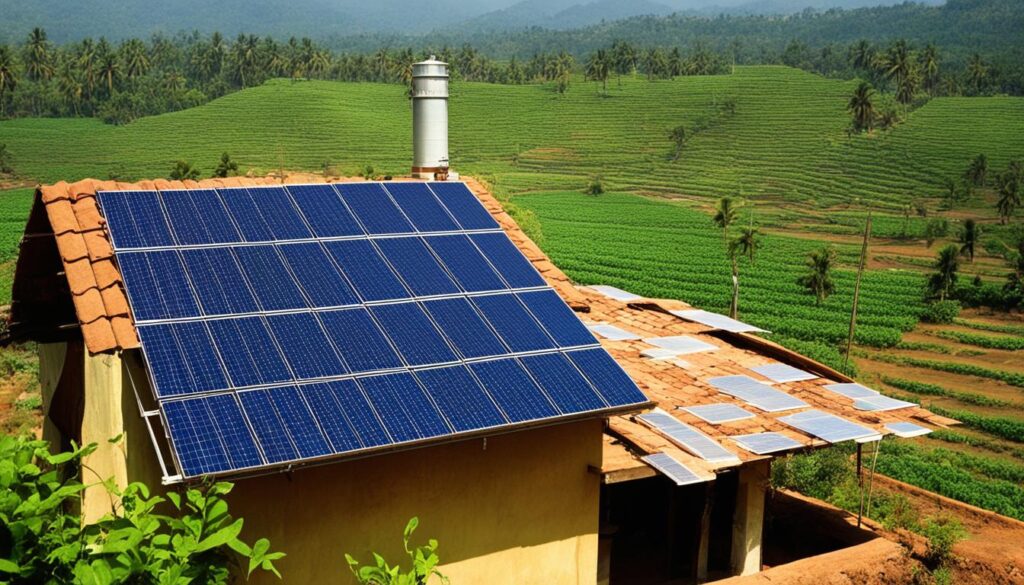There is Numoerous Benefits of Solar energy In India, that contribute to sustainable living and a greener future. The country has become one of the leaders in renewable energy due to strong government support and favorable economic conditions.
The use of solar energy helps improve economic development, energy security, and access to affordable and modern energy. In addition, solar energy has the potential to create a large number of domestic jobs.
India has set ambitious targets for renewable energy, aiming to achieve 175 GW by 2022, with a significant portion coming from solar energy. The projected primary energy consumption in India shows that solar energy will play a crucial role in meeting the country’s growing demand for electricity.
Key Takeaways:
- Solar energy in India contributes to sustainable living and a greener future.
- Government support and favorable economic conditions have propelled India to become a leader in renewable energy.
- Solar energy improves economic development, energy security, and access to affordable energy.
- India aims to achieve 175 GW of renewable energy by 2022, with solar energy playing a crucial role.
- Solar energy has the potential to create a significant number of domestic jobs.
Solar Energy Advantages
There is several Solar energy advantages, which make it a preferred choice for sustainable energy:
- Sustainability: Solar energy is a renewable energy source, meaning it will never run out. By harnessing the power of the sun, we can reduce our reliance on finite fossil fuel resources and create a more sustainable future.
- Low Environmental Impact: Compared to fossil fuels, solar energy has a significantly lower environmental impact. It produces no greenhouse gas emissions or air pollutants during operation, helping to combat climate change and improve air quality.
- Energy Independence: Solar energy systems allow individuals and communities to generate their own power, reducing dependence on centralized electricity grids. This energy independence provides resilience against power outages and increases energy access in remote areas.
- Cost-Effective: While the initial installation cost of solar energy systems can be higher, they offer significant long-term savings. Solar panels have a lifespan of 25 years or more and require minimal maintenance, resulting in reduced electricity bills and long-term cost benefits.
- Intermittency: One of the limitations of solar energy is its intermittency. Electricity is generated only when the sun is shining, which means that storage solutions or backup power sources are necessary to ensure a continuous supply of electricity.
- Land Use: Large-scale solar installations require a significant amount of land. However, solar panels can be installed on rooftops, reducing the need for additional land usage.
- Scarcity of Materials: Some solar technologies, such as thin-film solar cells, rely on rare materials. While this could pose challenges in terms of material scarcity, ongoing research and development are focused on finding alternative materials and improving the efficiency of solar energy systems.
- Environmental Downside: The disposal of hazardous waste from solar panels is an environmental concern. Proper recycling and disposal methods need to be implemented to minimize the environmental impact.
Despite these limitations, technological advancements are continuously addressing these disadvantages and making solar energy more efficient and cost-effective. With ongoing research and innovation, solar energy has the potential to play a significant role in achieving sustainable and clean energy for India and the world.

Conclusion
Solar energy offers numerous benefits for sustainable living in India. As a renewable energy source, it reduces carbon emissions and has a low environmental impact. By harnessing solar power, individuals can not only contribute to a greener future but also enjoy the advantages it brings.
One major benefit is the potential for significant cost savings. By investing in solar panels, homeowners can reduce their electricity bills and take advantage of government incentives and net metering policies that allow them to sell excess power back to the grid. Moreover, solar energy provides energy independence, freeing individuals from the uncertainty of rising electricity prices and grid outages.
In addition to financial benefits, solar energy also contributes to the overall energy security of India. By embracing renewable energy sources like solar power, India can reduce its dependency on fossil fuels and increase its energy self-sufficiency. This not only enhances energy security but also supports the country’s commitment to achieving its ambitious renewable energy targets.
Furthermore, the adoption of solar energy has the potential to create a multitude of job opportunities. The growth of the solar industry in India has already created employment for people in manufacturing, installation, and maintenance sectors. The expansion of solar energy projects across the country will further stimulate job growth and contribute to the overall economic development.
In conclusion, solar energy offers a multitude of advantages for sustainable living in India. From cost savings and energy independence to reduced reliance on fossil fuels and job creation, solar power presents a viable and efficient solution for meeting the country’s growing energy needs. By going solar, individuals can not only contribute to a greener and more sustainable lifestyle but also support India’s transition towards a cleaner and more prosperous future.
FAQ
What are the advantages of solar energy for sustainable living in India?
Solar energy in India offers numerous benefits such as reduced carbon emissions, low environmental impact, and energy independence. It can also help reduce electricity bills and increase the value of homes.
Is solar energy a renewable energy source?
Yes, solar energy is a renewable energy source. It uses the sun’s radiation to generate electricity and will never run out.
How can solar energy contribute to economic development in India?
Solar energy can stimulate economic growth in India by creating domestic jobs and reducing the reliance on fossil fuels. It also contributes to energy security and access to affordable and modern energy.
Does solar energy have any downsides?
While solar energy has numerous advantages, it does have some limitations. These include intermittency, land use requirements for large-scale installations, and the need for rare materials in certain solar technologies. The disposal of hazardous waste from solar panels is also an environmental concern.
How can solar energy help in reducing electricity bills?
Solar energy can help reduce electricity bills by generating electricity that can be used directly in homes or sold back to the grid. This reduces reliance on traditional electricity sources and can result in significant cost savings over the long term.
What are the targets for solar energy in India?
India aims to achieve 175 GW of renewable energy, including a significant portion from solar energy, by 2022. This demonstrates the country’s commitment to utilizing solar power as a primary source of energy.
Are there any challenges in implementing solar energy in India?
Some challenges in implementing solar energy in India include the initial costs of installation, intermittency issues, and the scarcity of certain materials required for solar technologies. However, advancements in technology and storage solutions are addressing these challenges.
How can solar energy contribute to a greener future in India?
By embracing solar energy, India can reduce carbon emissions, improve air quality, and reduce its reliance on fossil fuels. This transition to clean energy sources will help create a greener and more sustainable future.

